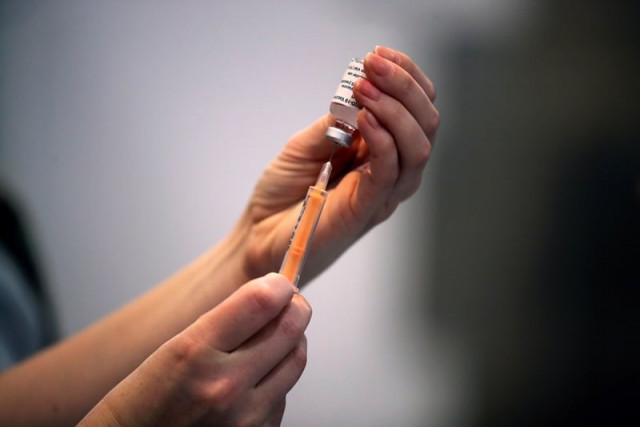Government-funded vaccine programme to cost Rs726b less
PIDE study asks govt to fund vaccination plan to protect economy from losses

The Pakistan Institute of Development Economics (PIDE) has said that the Russian vaccine, if administered by the government to the entire eligible population, will cost Rs438 billion, which appears to be Rs726 billion less than the money that the private sector will collect from people even at official rates.
PIDE - a public sector institute - has recommended the government to fund the vaccination programme to protect the economy from future losses in shape of lockdowns.
A PIDE paper has given the price range for two vaccines - one of Russia’s Sputnik and another of UK’s AstraZeneca. The cheapest - the AstraZeneca vaccine - is priced at Rs1,920 per person while the Sputnik vaccine will cost Rs3,200 per person. These rates are many times lower than the ones approved by the federal cabinet for the private sector for import and sale of Sputnik vaccine.
PIDE’s latest Covid-19 bulletin puts the eligible population at 137 million, which is higher than the government’s estimates and appears more realistic.
PIDE estimate for the eligible population - 18 years and above - is 38% higher than the 99.5 million that the Ministry of National Health Services and Regulations used to work out financing needs for vaccinating the population.
However, Planning Minister and National Command and Operation Centre (NCOC) Chairman Asad Umar said that about 110 million people were eligible for vaccination and “we hope that at least 70 to 80 million will be vaccinated”.
Every eligible person in Pakistan needs to be vaccinated and the government has to treat this as an emergency, reads the bulletin authored by Dr Durre Nayab.
The bulletin underlined that the biggest challenge was to allocate ample funds needed to serve the cause, more so in the midst of the financial crunch prevailing in the country.
Contrary to this, the government remains reluctant to procure vaccines and is either looking for donations or the private sector to jump in.
The Drug Regulatory Authority of Pakistan (Drap) has approved three vaccines for use in the country, which included vaccines of China’s Sinopharm, Russia’s Sputnik V and Oxford University-AstraZeneca.
PIDE said that the total cost of vaccinating the entire eligible population was equal to 0.58% to 1.21% of the previous year’s gross domestic product (GDP). The AstraZeneca vaccine would cost $12 or Rs1,920 per person and would require Rs263 billion to immunise the entire vulnerable population, it added.
The Sputnik vaccine price is estimated at $20 or Rs3,200 and the total cost will come to Rs438 billion. A mix of AstraZeneca and Sputnik vaccines will cost $16 or Rs2,560 per person and the total cost will come down to Rs351 billion.
PIDE has used the price estimates given by the World Health Organisation (WHO) PIDE has also given a high price scenario that shows per person cost at Rs4,000 or total cost at Rs548 billion - still half of what the private sector will earn assuming everybody is vaccinated.
However, all these estimates are far lower than the prices the government approved at the weekend for Chinese and Russian vaccines, which the private sector importers rejected, terming them below cost. The government has fixed the maximum sale price of Sputnik V vaccine at Rs8,449 for two doses and China’s Convidecia at Rs4,225 per injection, showed the summary of the national health services and regulations ministry.
If the private sector imports the Sputnik vaccine and sells it in the market, the total cost that the consumers will pay will be Rs1.164 trillion for 137 million eligible people. However, government imports will cost Rs438 billion.
PIDE underscored that the estimate how much funds are exactly needed remains elusive because prices of vaccines bought/ meant to be bought by Pakistan are not yet known.
Sinopharm, the only vaccine administered in the country so far, is too expensive to be bought, and if bought in smaller numbers, the price can go up to as much as $145 per dose. In the given circumstances, Oxford AstraZeneca and Sputnik V seem to be the most viable choices, according to PIDE.
Spending nearly 1% of GDP is not an easy financial decision but, in this case, it is an unavoidable one, emphasised PIDE. The country’s economic outlook for financial year 2019-20, which was marred by complete-to-partial lockdowns due to the Covid-19 pandemic, provides enough support to this idea, it added.
It will be a public expenditure that can protect the country from future lockdowns that have the potential to damage the economy.
However, the federal government has allocated Rs25 billion for the procurement of Covid-19 vaccine. Prime Minister Imran Khan had announced Rs770 billion cash package to deal with the aftermath of Covid-19. But Rs540 billion - or a whopping two-thirds of the PM’s Covid-19 economic relief package - remained unspent until June last year.
During the first half of this fiscal year, an amount of Rs116 billion was released, bringing the total spending under the Covid-19 package to Rs356 billion or just 46% of the cash component of the package.
Pakistan lags behind all other countries of the region in vaccination. PIDE said that the country was the last ones to take up the vaccine and the rate of administering it continues to be slower than in other countries. Sri Lanka, with its traditional focus on health, leads all the South Asian countries in the Covid- 19 vaccination drive, while Pakistan lies far behind everyone else.
Countries that bought/ordered the vaccine early and in bigger quantities got a better deal. Pakistan, sadly, is among those lagging far behind, according to PIDE.
Published in The Express Tribune, March 24th, 2021.
Like Business on Facebook, follow @TribuneBiz on Twitter to stay informed and join in the conversation.


















COMMENTS
Comments are moderated and generally will be posted if they are on-topic and not abusive.
For more information, please see our Comments FAQ